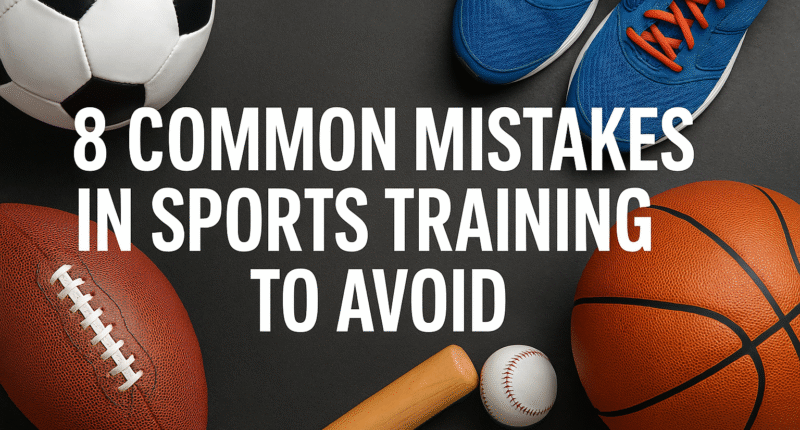Sports training is essential for improving performance, building strength, and staying healthy. However, many athletes and fitness enthusiasts make mistakes that can slow progress or even lead to injury. By understanding these pitfalls, you can train smarter and achieve better results. Here are eight common mistakes in sports training to avoid.
1. Skipping Warm-Ups
Warming up prepares the body for physical activity by increasing blood flow and flexibility.
Why It Matters
Skipping warm-ups can lead to muscle strains and injuries. A proper warm-up routine with dynamic stretches and light cardio is crucial for safe training.
2. Overtraining Without Rest
Many athletes believe training harder every day leads to faster results, but rest is just as important.
The Role of Recovery
Overtraining can cause fatigue, burnout, and injuries. Rest days allow muscles to recover and grow stronger, improving overall performance.
3. Ignoring Proper Nutrition
Training alone won’t deliver results without the right fuel for your body.
Fueling Performance
Skipping meals, eating junk food, or not drinking enough water reduces energy and delays recovery. Balanced nutrition with protein, carbs, and hydration is essential for sports training.
4. Poor Technique and Form
Performing exercises incorrectly increases the risk of injury and reduces effectiveness.
Focus on Technique
Whether lifting weights, running, or practicing a sport-specific skill, proper form ensures maximum benefit and prevents long-term damage. Consider working with a coach or trainer to refine technique.
5. Setting Unrealistic Goals
Ambitious goals can motivate, but unrealistic expectations often lead to frustration.
Train Smart, Not Just Hard
Expecting rapid results or comparing yourself to professionals may cause discouragement. Setting achievable, progressive goals helps maintain motivation and long-term consistency.
6. Lack of Consistency
Inconsistent training schedules prevent steady improvement.
Build a Routine
Skipping workouts frequently or training irregularly disrupts progress. A consistent routine creates discipline and builds momentum toward fitness goals.
7. Neglecting Flexibility and Mobility
Strength and endurance are important, but flexibility is often overlooked.
Stretching for Better Performance
Failing to include stretching or mobility exercises can limit range of motion and increase injury risk. Incorporating yoga, pilates, or simple stretching helps maintain balance in training.
8. Not Tracking Progress
Without measuring results, it’s hard to know what’s working and what needs adjustment.
Stay Accountable
Using training logs, apps, or wearable devices helps track workouts, performance, and improvements. Monitoring progress ensures that training stays effective and goals remain within reach.
Conclusion: Train Smarter, Not Harder
Sports training is about more than just pushing your limits—it’s about training with awareness and balance. By avoiding mistakes like skipping warm-ups, overtraining, poor nutrition, and neglecting flexibility, you can improve performance safely and effectively. Staying consistent, setting realistic goals, and tracking progress will help you achieve lasting success in your sports journey.








